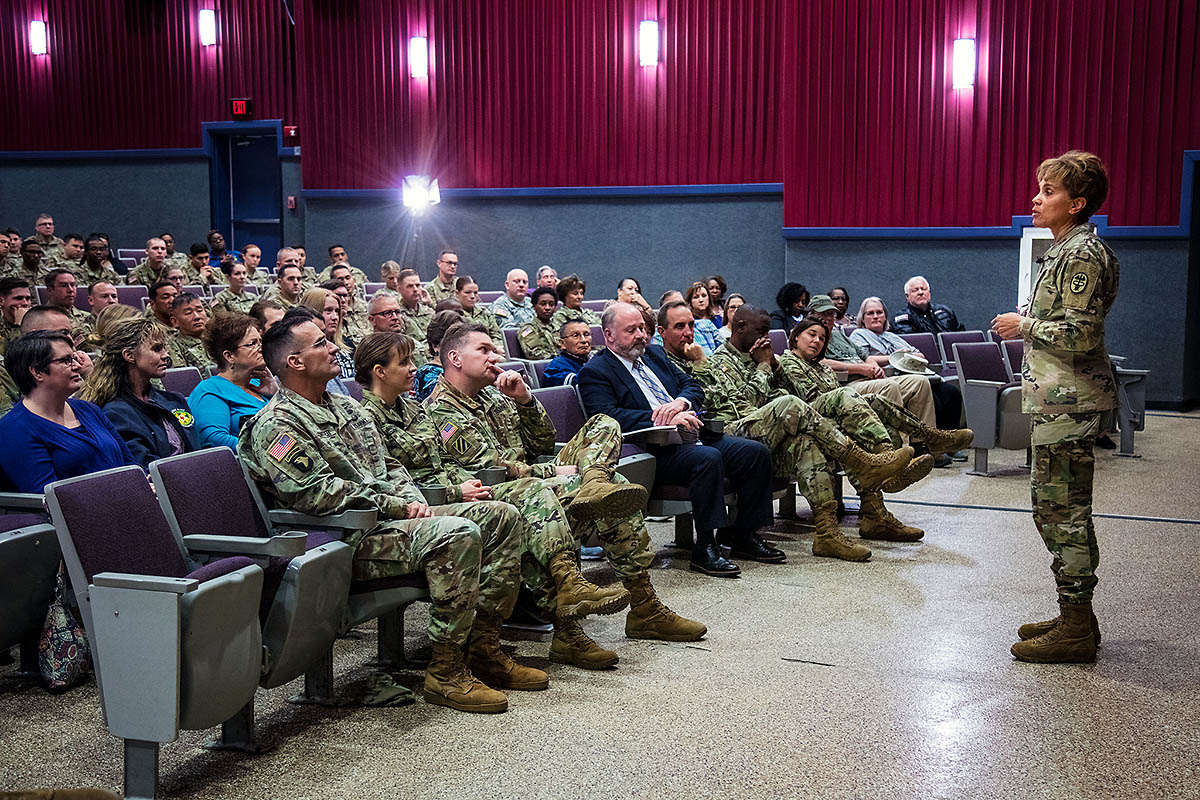Written by Maria Yager
Blanchfield Army Community Hospital Public Affairs
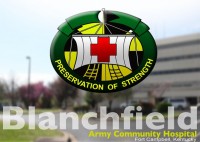 Fort Campbell, KY – U.S. Army Surgeon General and Commanding General U.S. Army Medical Command Lt. Gen. Nadja Y. West visited Fort Campbell to meet with Army and community leaders and share her message for all of Army Medicine October 29th to 31st, 2018.
Fort Campbell, KY – U.S. Army Surgeon General and Commanding General U.S. Army Medical Command Lt. Gen. Nadja Y. West visited Fort Campbell to meet with Army and community leaders and share her message for all of Army Medicine October 29th to 31st, 2018.
West began her visit with a meeting with the 101st Airborne Division (Air Assault) Acting Senior Mission Commander, Brig. Gen. Todd K. Royar, followed by a round table discussion at 101st Airborne Division (Air Assault) headquarters with brigade command team leaders to personally ensure they are getting what they need from Army Medicine to support medical readiness for their Soldiers.
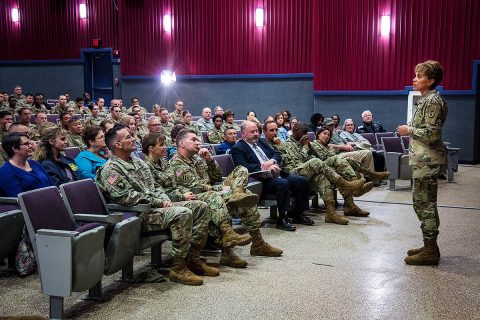
“When we go around [the Army] one of the things Command Sgt. Maj.[Michael A.] Gragg and I insist upon doing is meeting with the command teams on the installations because that’s a perspective that we need, to make sure we’re providing the support that they deserve. We can’t know that unless we hear it from them,” said West.
She said that medical readiness is the top priority for Army Medicine because if Soldiers are not medically ready to deploy it will impact the Army’s overall mission to deploy, fight and win the nation’s wars.
“Medical readiness is tremendously important. We strive every day to ensure we are trained and ready to perform our combat tasks. But, if we’re not medically ready and taking care of our Soldiers and their medical needs then our efforts will fall short. We have to be both medically and combat ready,” said Col. Derek Thomson, commander 1st Brigade Combat Team, 101st Airborne Division (Air Assualt).
Under West’s leadership Army Medicine has worked to reduce the rate of non-deployable Soldiers in the Army in part by drilling down into the Medical Protection System used to track immunization, medical readiness, and deployability data for all Soldiers.
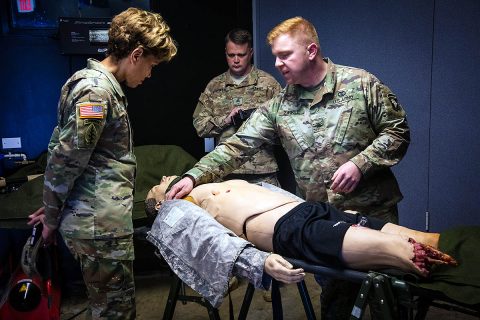
The system outlines the medical and dental readiness requirements each individual Soldier needs and allows medical personnel to take action. West said the Army’s rate of Soldiers who are medically ready to deploy are at historic highs in all three Army components; Active Component, National Guard and Reserve.
“My message to the commanders, our Soldiers who depend on us, our families and the community, is that readiness is number one,” said West, echoing a top priority of Chief of Staff of the Army, Gen. Mark. A. Milley.
“And what that means for Army Medicine is that we need to be at the top of our game — the providers and all the team members who make up Army Medicine — to ensure we’re providing the absolute best care to prepare our Soldiers and their families and community and to make sure that they are healthy, and also if they get injured or sick, that we have the absolute best care to nurse them back to health or to repair any injuries that they have,” stated West.
“[Army leaders] have a great vision of taking our Army to the next level, to make sure we’ve got the capabilities in all areas, not just medical, but our entire force to make sure we maintain our supremacy and ensure we are able to maintain overmatch with our adversaries,” said West. “So we at Army Medicine are going along right with our Army to make sure we are modernized and have the capability and have the configuration to best support our Army to do that.”
At the 531st Hospital Center, West received a force design update as the Army transitions its Combat Support Hospital platform to a more modular 32-bed field hospital. The field hospital can be expanded incrementally to a 148-bed design, encompassing four medical detachments. It contains a suite of medical and dental services to choose from based on the mission.
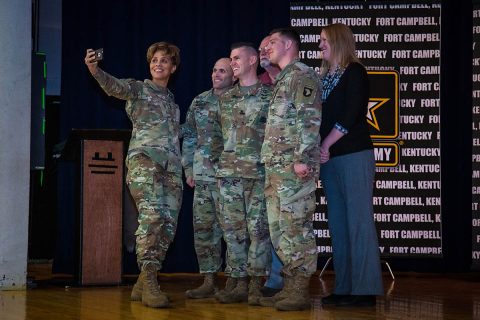
Its design gives medical planners more flexibility in sending only the modules and personnel it needs. Designed to deploy to a combat theater of operation, field hospitals provide line commanders Role III (hospital level) medical support to help conserve the fighting force. The field hospital provides services ranging from routine sick call and primary care to emergency medical treatment and surgical services.
West also visited the Alfred V. Rascon School of Combat Medicine, the Army’s first medical simulation training center, to see how they are training and preparing medical personnel to serve in conditions they may experience when deployed. As the leader of Army Medicine, West said she is focused on ensuring her Soldiers are receiving the training and capability they need to fulfill their mission.
“In my day, it was hard plastic mannequins that didn’t move but now you have ones that will blink and bleed. When Soldiers apply a tourniquet, they have to really apply enough pressure to stop the bleeding. You have to put 50 pounds of pressure to stop bleeding. That’s not just putting your hands down [over a wound], you have to really apply that pressure. So Soldiers are really getting to practice what they have to do to save a life and that’s important,” said West.
The general rounded out her visit by conducting two town hall meetings, one face-to-face with the local beneficiaries and Soldiers and civilians serving on Fort Campbell and a second, Facebook Live town hall that allowed Soldiers and beneficiaries anywhere on the internet to connect and submit their questions.
West shared her thoughts and answered questions on a range of topics for Soldiers and beneficiaries. More than 12,000 individuals viewed portions of the Facebook Live town hall that reached more than 30,000 within 24-hours.
“She talked to us about where the Army is going, as well as MEDCOM (U.S. Army Medical Command) in general. It was a great town hall and she answered a lot of our questions as clearly and as detailed as possible,” said Capt. Ijagha Eme, a doctor assigned Blanchfield.
Her visit concluded with a visit with Vanderbilt University Medical Center Chief Executive Officer, Dr. Jeffrey Balser. She also spoke with students studying health professions at the university.
West was stationed at Blanchfield Army Community Hospital at Fort Campbell in the 1990s and served as a staff family physician and then the officer in charge of the Aviation Medicine Clinic. While there she also participated in a medical mission with the 5th Special Forces Group (Airborne).
Beneficiaries may watch her Facebook Live town hall on the Blanchfield Army Community Hospital Facebook page at www.facebook.com/BACH.Fort.Campbell/videos/686232908412884

